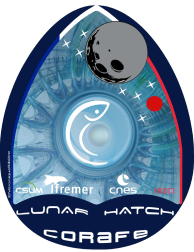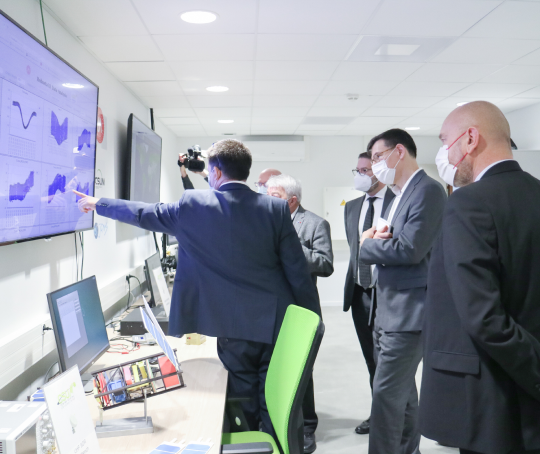Launch Vibration on fish Embryo (LAUVE) Project
LAUNCH VIBRATION ON FISH EMBRYO (LAUVE) PROJECT

The concept of food self-sufficiency in a space colony requires local food production.
Recent discoveries in this field support the idea that the first food animal produced in space will be an aquatic organism.
FISH EGGS IN SPACE
The LAUVE project proposes an experiment involving fertilised fish eggs that are subjected to vibrations similar to those encountered during the take-off and transfer orbit to the Moon.
The CSUM has access to the LMGC’s vibration testing facilities, which allow it to evaluate the behaviour of the fertilised eggs when subjected to high levels and durations of vibration (variations in frequency, amplitude, spectrum shape and duration). The project makes it possible to evaluate biological choices (the type of organism), protocols for transporting fish eggs and also technological equipment (a sealed tank).
PARTNERS
The Ifremer L-3AS-UMR MARBEC Joint Research Lab in Palavas Les Flots:
This is a specialist in aquaculture and aquatic production systems. It offers a wealth of aquaculture expertise on system monitoring (Coves et al., 1998; Li et al., 2015; Sammouth et al., 2009), fish nutrition (Przybyla et al., 2014), bioremediation of fish farm waste (d’Orbcastel et al., 2008), trophic cascades (Mladineo et al., 2010), as well as alternative sources of aquaculture feed (Marques et al., 2016). This laboratory is heavily involved in studies on trophic cascades and in particular the use of micro-algae as an alternative source of food for farmed organisms (fish, molluscs, crustaceans). This IMTA type system can easily be integrated into the “Bioregenerative Life Support System” (BLSS) of a terrestrial or lunar orbital station. The L-3AS laboratory is also involved in the “Lunar Hatch” project.
Cyrille PRZYBYLA: Research engineer in multi trophic aquaculture in extreme environments. Graduate of the Observatoire de Paris in “Celestial mechanics”. LAUVE project leader
Eric GASSET: Aquaculture engineer, specialising in early life stage embryogenesis in marine fish. Expert in the production and domestication systems of new species.
Gilbert DUTTO: Senior technician with expertise in early life stages of fish and in long-distance land transport of embryonated oocytes.



ThE CSUM
CSUM is a European benchmark centre for the development and operation of nanosatellites by students. The engineers, who make up a team of 20 FTEs from the space industry (Airbus, OHB, ZDS, etc.), are specialised in the implementation of innovative solutions for nanosatellite applications. Supported financially by the Van Allen Foundation and CNES, the CSUM is an R&D centre that aims to provide scientific missions to the research community to facilitate access to space.
Laurent DUSSEAU: Professor, Director of the CSUM, Expert on the effects of space radiation on systems
Muriel BERNARD : Research Engineer, Quality and Dissemination Director